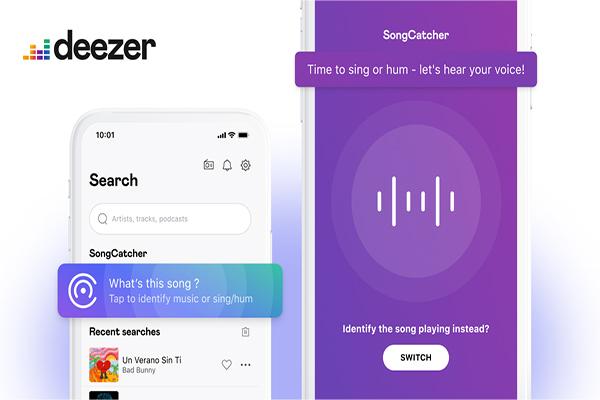SongCatcher Names the Tune Stuck in Your Head—And Then Plays It

"Everyone knows how frustrating it can be to have a song stuck in their heads, and we're very proud to be the first music streaming service in the world to give our users the opportunity to identify a track by just humming, singing, or whistling it directly in the app," said Deezer VP Alexandra Leloup. "As we keep improving the algorithm, the feature will become faster and even more accurate when it comes to recognizing songs across our 90 million track library."
When I tested the feature, it was hit-or-miss. But it’s hard to blame it on the app — as much as I love music, I'm not great at carrying a tune. When you tap the Search icon, SongCatcher starts listening for a song playing in your surroundings. If you want the app to identify a song you’re singing or humming, just tap Switch.
I sang several lines of Wild World and SongCatcher quickly found a new cover of the song, though it didn’t play the Yusuf Islam (a.k.a. Cat Stevens) original. The app didn't do as well when I tried humming the Led Zeppelin classic Stairway to Heaven, but it ultimately recognized the song when I sang some of the lyrics.
Other Ways to Name that Tune
If you don't subscribe to Deezer, the SoundHound app also can identify songs in its surroundings or through humming or singing. SoundHound specializes in voice AI (artificial intelligence) so its algorithms are supposed to be more robust than Deezer's.
The app was able to quickly name the Song For You when I sang a few bars, but didn’t display Leon Russel's version, even though he wrote and sang the original version. SoundHound also had a problem identifying Stairway to Heaven but my off-key voice was mostly likely the culprit in this case.
SoundHound can be connected to your Apple Music or Spotify account to play full song versions of the songs it finds.
Using Google’s mobile app is perhaps the easiest way to find the names of songs you hum or sing. Machine learning models power the search. It converts your humming into a number-based sequence that matches the song's melody. Search results are displayed with how well it matches the result and shown as a percentage. With more than a million songs in its database, it's the fastest search of the three.
Tap on the microphone in the search bar of the Google app to bring up a new screen with a "Search a song" button. When you tap the button, you can hum, whistle, "la-la-la," or sing the lyrics to a song. Clearly, my Led Zeppelin humming skills are not up to par, but it recognized Stairway to Heaven with the lyrics.
If you want to play the song immediately, Google will display search results of YouTube videos of performances, but it won't display links to play it in a music app.
The good news is you no longer have to make yourself crazy trying to figure out the name of that song playing endlessly in your head.





























































